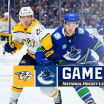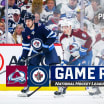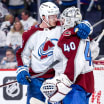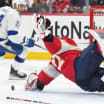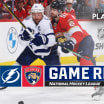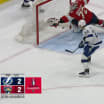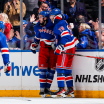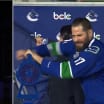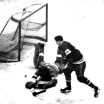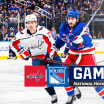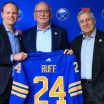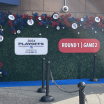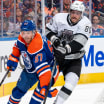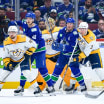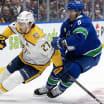A Seattle expansion team will play in the NHL starting in 2021-22. NHL.com is posting a series of stories this month about the NHL Seattle organization, the local hockey scene and the city's rich hockey history.
Today, NHL Seattle president and CEO Tod Leiweke.
Seattle NHL expansion team gets unique vision with Leiweke as president
Former executive with Wild, Lightning, NFL's Seahawks has passion for connecting with fans
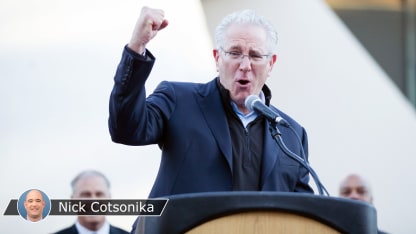
SEATTLE -- What will an NHL game be like in Seattle?
For clues, look at the career of Tod Leiweke and the kind of environment he has helped create.
When the Seattle Seahawks leave their locker room at CenturyLink Field, the first thing they see is who and what they represent. Across from the door is a larger-than-life photo of fans cheering and embracing players.
"HOME OF THE LOUDEST FANS IN THE NFL," it says.
The first to fly out of the tunnel is an actual hawk, Taima, whose name means "thunder" and was chosen by the fans.
As the Seahawks take the field, a player carries a 12th Man flag. There is one hanging outside the locker room, signed by fans, and others are all over the stadium. The fans are the 12th Man or the 12s. They are part of the team.
The fans roar. Music blares. After a Seattle native sings the anthem, the volume cranks higher. A local celebrity raises the 12th Man flag on a platform high above the south end zone.
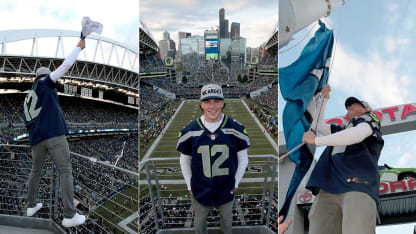
Washington Capitals forward T.J. Oshie, who was born in Everett, Washington, is one of many local celebrities the Seattle Seahawks have used to wave the 12th Man flag at home games.
Before the preseason game against the Oakland Raiders on Aug. 31, it was Washington Capitals forward T.J. Oshie, who was born in nearby Everett, played 10 years in the Seattle Junior Hockey Association and won the Stanley Cup last season.
Before the Seahawks played the San Francisco 49ers last Sunday, it was actor Jeffrey Dean Morgan, a Seattle native who has appeared in the TV shows "Grey's Anatomy" and "The Walking Dead."
The noise could wake the dead. The Seahawks have held the Guinness World Record for loudest crowd roar at an outdoor stadium. Seismologists have recorded the vibrations.
"We have the best fans," Seattle Mayor Jenny Durkan said. "When we play a Seahawks game, we literally cause an earthquake. So I can hardly wait to see what happens in the new arena for hockey."
Leiweke led the Minnesota Wild when they launched as an NHL expansion team, the Seahawks when they became who they are today, the Seattle Sounders when they launched as a Major League Soccer expansion team and the Tampa Bay Lightning when they became a top organization, and that's just part of his resume.
He was COO of the NFL but he left to become president and CEO of NHL Seattle. He has vast experience, a passion for hockey and a love for this city, and they're all coming together here.
Common themes in his career have been authenticity, community and philanthropy, not to mention energy and enthusiasm. He has focused on fan service, sense of place and event experience, taking ideas from team to team and coming up with new things.
The 12th Man flag ceremony in Seattle echoes "Let's play hockey!" in Minnesota. High school football helmets hang at CenturyLink Field like high school hockey jerseys do at Xcel Energy Center. There is real lightning at Lightning games like there is a real hawk at Seahawks games.
Leiweke will not take credit, except for perhaps fostering teamwork. He said a competitive team is most important.
"I think if you attribute this to any one person, first, it's not fair, and second, it's not healthy for an organization," he said. "And this is the ultimate team game."
But that is central to who he is and how he leads.
This is someone who climbs mountains and knows lots of other people at the top -- he summited Mount Rainer in a group that included NFL Commissioner Roger Goodell in 2009, raising hundreds of thousands for charity -- but parks in the regular lots to make sure he understands the life of the fan.
Those who have worked with him gush about him. NHL Seattle COO Victor de Bonis called him a sports evangelist. In the book "How to Bake an NHL Franchise from Scratch: The First Era of the Minnesota Wild," former Wild assistant general manager Tom Lynn wrote he had "talent on loan from God."
"Tod is a very humble guy," former Wild GM Doug Risebrough said. "Something would happen, and he was deflecting everything to everybody else. Over time, I knew where it all came from. Some of it might have been from somebody else, but it was Tod that hired that somebody else and saw that unique ability in that person."
Employees have followed Leiweke from opportunity to opportunity. This time has been no different. De Bonis worked with him with the Vancouver Canucks. Senior adviser John Rizzardini worked with him with the NBA's Golden State Warriors, then the Canucks, then the Seahawks and Sounders.
"If you follow the different franchises over his career, I would say that every time, every new initiative, it would get better and better and better and better," de Bonis said. "And I think the goal here is for this to be the best one."
The goal is exactly that.
"We're going to try to have a game experience that is just absolutely perfect," Leiweke said. "I've been studying it my whole life. I love that part of it. In my career, I've gotten close to getting it right. It's never been …"
He paused.
"We're going to try to make this perfect," he said.
* * * * *
Leiweke was born in St. Louis. He was 7 when the St. Louis Blues launched as an NHL expansion team in 1967. He played hockey from ages 7 to 12. One Saturday morning, his peewee team got to take the ice at St. Louis Arena.
"The lights weren't on yet, and we skated out there, and that's just this thing that imprints," he said. "That's why, in part, I love this business, because I think we will get to do that time and time again with our games and other things, creating moments for people that become important moments in their life."
He referred to St. Louis Arena as "that old, beautiful building" and said for him the organ was a big part of authenticity in hockey.
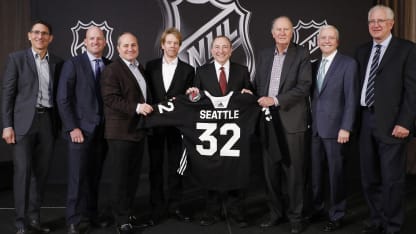
© Patrick McDermott/Getty Images
NHL Seattle president and CEO Tod Leiweke (far r.) and NHL Commissioner Gary Bettman (c.) pose with ownership group members (from l.) Adrian Hanauer, David Wright, Jay Deutsch, Jerry Bruckheimer, David Bonderman (majority owner) and Len Potter after the NHL Board of Governors approved the 32nd NHL team Tuesday.
The family moved to the country, and he didn't have the chance to play hockey anymore. But he kept following the Blues on KPLR-TV. After high school, he moved to Colorado and took up hockey again.
Leiweke's first NHL experience came as an executive vice president of business with Orca Bay Sports and Entertainment in the 1990s. The Canucks moved from Pacific Coliseum into a new arena and the Vancouver Grizzlies launched as an NBA expansion team. Guess who was in charge of selling 12,500 Grizzlies season tickets?
"The personality is one that you're always excited to see him and always pumped up when you leave," said Vegas Golden Knights GM George McPhee, who worked with Leiweke as Canucks director of hockey operations. "Just a real positive human being, nothing contrived, super smart, loves hockey, played hockey as a kid in St. Louis. He's just one of those guys that you feel fortunate to intersect with at some point in your life, because he's special."
Leiweke was with colleagues at a Grizzlies game one night when he disappeared. They didn't know where he went, and he didn't reappear until the fourth quarter. As it turned out, a sound effect wasn't quite right and needed to be better to build the intensity for the fans. So he went to the booth, worked the system himself and showed the crew how to do it.
"He wasn't sitting there complaining about it," de Bonis said. "He was up there teaching and supporting the people, because they don't know how much liberty they have to do that or what to do and he wanted to set the table. And that's what it's all about."
Leiweke and Bonderman discuss the future in Seattle
* * * * *
Leiweke became president of the Wild in 1999, six years after the Minnesota North Stars left for Dallas and took the "North" out of their name.
"It was not an automatic, believe me," Risebrough said. "It was not a foregone conclusion. I mean, there were a lot of people back then that were wondering how the NHL was going to do. 'They've been here once. Why did they leave?' So ultimately it became a very successful franchise because it was very ingrained in the Minnesota hockey culture very quickly.
"The potential challenge there that I think Tod oversaw or understood was, it could not dominate the hockey community and have the other parts of the community suffer. It had to be part of the hockey community, not the top of the hockey community and everybody else listen to what we're doing.
"It was just, 'We're one dynamic in this great state of hockey.' That's Tod. That's Tod right there."
The Wild branded Minnesota as the "State of Hockey." They invited a kid to skate with a "State of Hockey" flag before games and used program sales to benefit minor hockey associations.
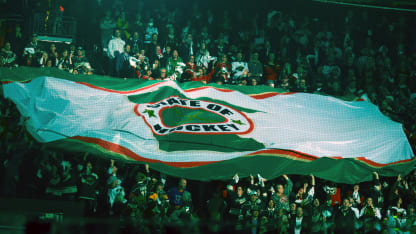
© Icon Sportswire/Getty Images
The NHL made a successful return to the 'State of Hockey' partly because of Tod Leiweke's guidance with the expansion Minnesota Wild.
Knowing the importance of high school hockey in Minnesota, they hung a jersey from each high school in the state at the new Xcel Energy Center in St. Paul.
They retired the No. 1 in honor of their fans.
"It became a Minnesota building," Risebrough said. "It didn't just become an NHL building. That was him."
The Wild created an organ shaped like a Zamboni and a replica of the famous Split Rock Lighthouse northeast of Duluth on the shore of Lake Superior. The plan was to shine the light and sound the foghorn when the Wild scored.
Before the inaugural home opener Oct. 11, 2000, Leiweke burst through a door.
"The lighthouse is finished!" Leiweke said. "We're all set!"
"I hope we score a goal," Risebrough thought to himself.
The Wild scored three, tying the Philadelphia Flyers 3-3.
Each North Stars game started with public address announcer Bob Utecht saying, "Let's play hockey!" Why not have local celebrities say it before Wild games?
"It was his idea," Risebrough said.
The first time the Wild played Dallas at home, on Dec. 17, 2000, out came Neal Broten. He was a Minnesota native. He had played at the University of Minnesota, for the 1980 U.S. Olympic team and for the North Stars for 11 seasons before moving with them to Dallas. He wore a Stars jersey …
And ripped it off to reveal a Wild jersey underneath.
"It gets this massive cheer," Risebrough said. "But it was a good way to bridge a little bit of the Minnesota North Stars history, kind of addressing that heartache of them leaving and welcoming the NHL team back."
Minnesota defeated Dallas 6-0.
A couple of years later, Leiweke had another idea: a book that would tell the story of the Wild and outline their plan for success, from the lives of the trainers and the scouts to how forward Marian Gaborik would go from good to elite. It was not for the media. It was mailed with the season tickets.
"'We did this for you, the fans,'" Risebrough said. "'You, our season ticket holders. You, the people who have invested in this community.'"
The Wild made the Stanley Cup Playoffs in their third season. Including the preseason, regular season and playoffs, they sold out their first 409 games.
"It is impossible to accurately describe how Tod positively affected the Wild organization (and later the Seattle Seahawks, Portland Trail Blazers and Tampa Bay Lightning)," Lynn wrote in his book. "He had a Midas touch unlike any I had seen in the sports business before or since.
"People loved working for him, at the same time increasing their performance and productivity as they enjoyed working harder. He did not yell or scream or fire people, but employees upped their game for him. He seemed most interested in creating a fun environment, getting departments to work together, and making people feel valued. These all sound good in management books, but I had never seen them work in reality until Tod."
Lynn wrote that before Leiweke left Minnesota, he took him to lunch with notecards and a pen. They'd been friends, but he still didn't understand how Leiweke did it. So he interviewed him about his life and career.
Leiweke's tips fit on one notecard: "Allow people to do their own work. Leadership is supporting those working for you. Improve challenging situations incrementally. Remember the 85 percent rule -- if you hit 85 percent of goal, you will be a success."
Lynn kept that notecard on his desk.
* * * * *
The 12th Man was not Leiweke's idea. The Seahawks retired No. 12 in honor of their fans Dec. 15, 1984, back when they rocked the Kingdome.
But the Seahawks and the community disconnected in the 1990s and early 2000s. Owner Ken Behring tried to move the team to Anaheim over issues with the stadium. Paul Allen bought the team after the state agreed to finance a new one. Even after it was built, he needed help.
"Paul knew that we needed to have the person that had the dynamic personality and the vision to reconnect us with the community," said Seahawks president Chuck Arnold, who was director of ticket sales and operations then. "That's when Tod was hired."
Leiweke became CEO in 2003. His first game didn't sell out. That October, the Seahawks gathered 12 fans who had been season ticket holders since the birth of the team in 1976. They became the first to raise the 12th Man flag.
The next year, Leiweke started the Spirit of 12 Partners. Community-based nonprofit organizations sold programs at home games and kept 100 percent of the proceeds, matched by the Paul G. Allen Family Foundation. That has raised $4.2 million.
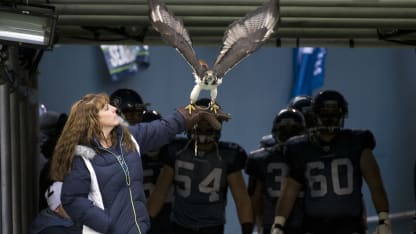
© ROD MAR
Taima the hawk is one of several popular in-game attractions the Seattle Seahawks added under Tod Leiweke.
The next year, the Seahawks put up a display in the concourse. On a field, the shape of the state of Washington is a football. On top of that are replica helmets of each high school football team in the state.
"THE STATE OF FOOTBALL," it says.
"It's amazing when you're at a game, the audience that stands below it taking pictures and videos," Arnold said. "It's really impactful to stand there and look up at it. It kind of connects that experience of being at the game with memories of you playing high school football or watching high school football, or it's just finding your helmet that's your team, the high school you attended."
The next year, Taima the hawk began leading the team out of the tunnel.
Leiweke became CEO of Allen's Vulcan Sports and Entertainment in 2007, overseeing not only the Seahawks, but the NBA's Trail Blazers and the launch of the Sounders in 2009.
Those teams combined for 201 straight sellouts on his watch. The Seahawks' sellout streak has reached 135 games. The Sounders led MLS in attendance their first eight seasons and ranked second to Atlanta United the next two.
"Tod's got a proven track record," Arnold said. "He's got great energy, great vision, and community comes first for him. I think that he has the right approach to make that connection. He's also very genuine and a guy that's very approachable, and people gravitate towards that energy and vision."
* * * * *
Leiweke was known to play rec hockey while in Seattle. More than once, Canucks captain Markus Naslund used his Seahawks seats, according to the Globe and Mail.
According to the Puget Sound Business Journal, when Leiweke left in 2010 to be a minority owner of the Lightning and CEO of Tampa Bay Sports and Entertainment, Allen said, "I'm sorry to see him go, but I know hockey is his first love."
The Lightning, who had won the Stanley Cup in 2004, were down to 3,000 season ticket holders.
"While the Lightning wasn't an expansion team, it was pretty darn close to being a startup," said Tampa Bay CEO Steve Griggs, who was vice president of sales and service under Leiweke with the Wild and COO under him with the Lightning. "I think the playbook that we had in Minnesota really helped us transform the Lightning here."
That, and new owner Jeff Vinik.
"[Tod] doesn't get credit for this, but I think he forges the best partnership I've ever seen with not just the community but the owners," said Tim Leiweke, Tod's brother. "If you look at Tampa Bay and the relationship he had with Jeff, it was amazing.
"Those two saw the world the same way. Jeff empowered Tod to think big about the impact on the community, and Tod in turn empowered Jeff to think about greatness on the ice and in the organization as a whole, and the impact they have made in that community has been spectacular."
Vinik spent about $75 million in private money to upgrade the arena, which is owned by Hillsborough County.
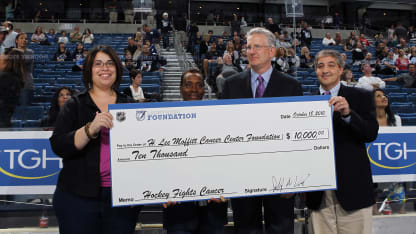
© Mike Carlson/Getty Images
Tod Leiweke and owner Jeff Vinik (far r.) helped make the Tampa Bay Lightning a mainstay in the community and a perennial contender in the NHL.
The Lightning added an organ, artwork indigenous to the west coast of Florida and Tesla coils in the rafters.
"If you're going to be called the Tampa Bay Lightning, you need to have lightning in your building," Griggs said.
They installed a massive, high-definition scoreboard and an 11,000-square-foot, outdoor party deck. They rebranded the uniforms, giving them a simpler, more classic look, and gave each season ticket holder a jersey embedded with a microchip coupon: 25 percent off food and beverage, 35 percent off retail.
Vinik created the Lightning Community Hero program. At each regular-season and playoff game, the Lightning have honored someone who has made a positive impact in the community with a video tribute and $50,000 to the charity of his or her choice. They have honored 340 community heroes and have given more than $17 million to more than 400 area nonprofit organizations.
"Add all those things together, and you've created this organization that is a part of the community and embedded in the community," Griggs said. "Every decision we made was, 'What's best for the organization? What's best for our owner? And most importantly, what was best for our fans and our community?'"
By the time Tod Leiweke left for the NFL in 2015 to be No. 2 to his friend Goodell, the Lightning had 13,000 season ticket holders.
"Tampa Bay was a team that many people thought would never make it, and now they're one of the most stable, successful and passionate groups of fans of all of the NHL teams," Tim Leiweke said. "Everywhere [Tod has] gone, that's what he's done. … There is no moment in his history, in his career, where he didn't have a massive impact and massive success."
* * * * *
Tod Leiweke was in an NFL meeting March 1 when he received a text message from his brother.
"Call me," Tim told him. "It's an emergency."
Tod left the meeting and called him back.
Tim is the CEO of Oak View Group. The company was working on a deal to renovate KeyArena -- actually, to build a new arena under its iconic roof to retain the character of Seattle Center, the park-like campus of cultural attractions built for the 1962 World's Fair.
A new arena hinged on an NHL expansion team, and an NHL expansion team hinged on a new arena. Both hinged on a drive for season ticket deposits that had started that morning.
Tim told Tod that Oak View Group had reached its goal of 10,000 in 12 minutes. It would reach 32,000 in 31 hours, stop taking deposits and open a waiting list.
On April 11, Tod left the NFL for the NHL for the second time.
"Well, there won't be a third, so let's start with that, OK?" Tim said. "I think this is probably where he gets a chance now to spend the rest of his career. That's what I hope."
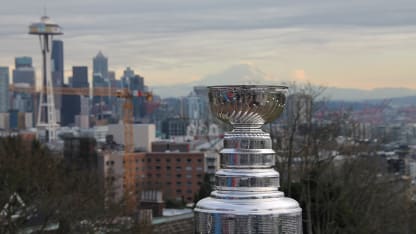
Seattle, the first U.S. city with a Stanley Cup championship, will hope to add another when its NHL expansion team begins play in the 2021-22 season.
Tim said Tod is more than president and CEO of NHL Seattle. He's an owner. And this ownership group hopes to bring an NBA team to Seattle someday too.
Tim, 61, and Tod, 58, have competed against each other for years. Before co-founding Oak View Group in 2015, Tim was president and CEO of the parent companies of the Los Angeles Kings and Toronto Maple Leafs. Each brother is a titan of this industry on his own, and this is the first time they have worked together since the 1980s and the first time ever at this level.
"Assuming we don't have food fights, we'll be OK," Tim said.
There is a huge commitment here. The ownership group is investing $50 million for a parking garage, $75 million for a training center, $650 million for the NHL expansion fee and $800 million for the arena.
There is so much with which to work here too: the natural environment, the native culture, the music scene, the tech companies.
Seattle was the first U.S. city to win the Stanley Cup when the Seattle Metropolitans of the Pacific Coast Hockey Association defeated the Montreal Canadiens of the National Hockey Association in 1917, months before the NHL was born.
High-level hockey has been played here ever since. The first sporting event under the roof where the NHL team will play was an exhibition between the Maple Leafs and Seattle Totems of the professional Western Hockey League in 1964.
"This is a place with such a strong sense of self," Tod said. "And then that building has a soul. And Seattle Center has a soul. I think we have such a great opportunity to create a sense of place that is truly authentic.
"We should have history and traditions the day we open, because this is not a nondescript community. This is a community with lots of personality and lots of distinctness, lots of iconic symbols. And there's the Space Needle."
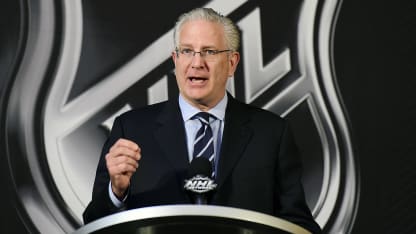
© Patrick McDermott/Getty Images
Tod Leiweke has helped boost teams in several leagues, but Seattle, home of a newly awarded NHL team, could be his last stop in an impressive career.
Now that the NHL Board of Governors has awarded Seattle an expansion team and ground has been broken on the new arena, Tod said NHL Seattle can focus more on the fun stuff.
"We're going to turn the knobs up on that, and it is a really important thing all the way around, recruiting staff here, recruiting players, serving your fans," he said. "We have to have that passion."
Tod sat in his office near the arena one day recently. The team had 11 employees and several empty desks waiting to be filled. Behind him stretched a view of Elliott Bay. In front of him sat two whiteboards, a blank canvas.
"The challenges abound, but I don't really think about the challenges," Tod said. "I always think …"
He paused.
"I just live with the opportunities," he said, then pounded a hand on the table. "Like, 'Wow! Think about this, this, this, this, this …'"
